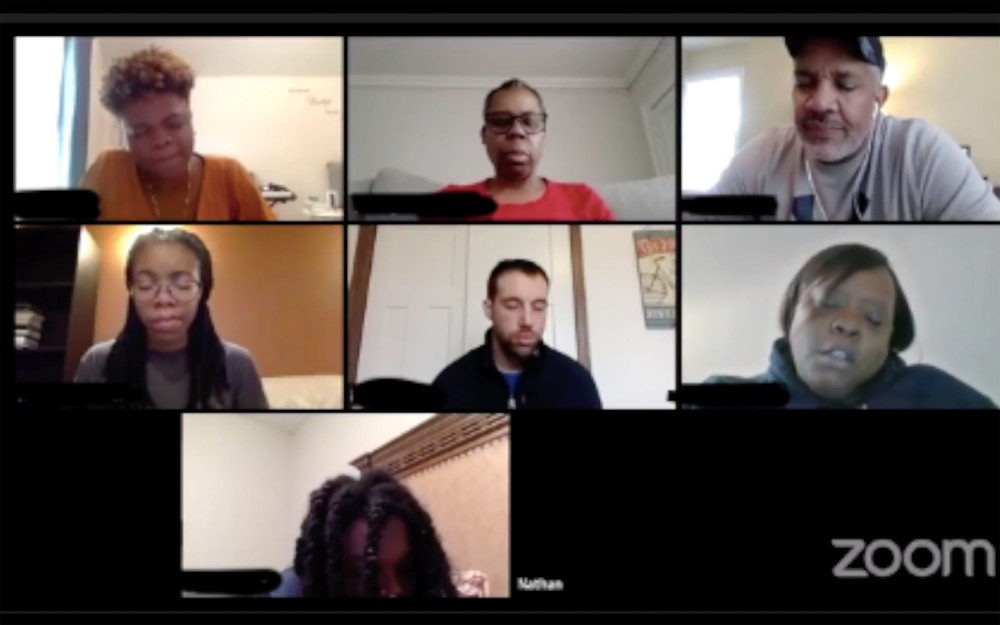Black churches, others face hate on Zoom

With their eyes closed in prayer, asking God to help the country’s overburdened health-care workers, members of the Impact Movement ministry group never saw the attack coming.
“God is dead, God is dead,” they suddenly heard a young male voice say in their Zoom video conference. Then other voices joined in, laughing and chanting: “N****r, n****r, n****r.”
When members of the national black Christian campus ministry group opened their eyes at the unexpected voices and words, the screen was showing footage of the New Zealand mosque shooting.
“They were snickering, they started drawing red marks for blood,” recalled Jimmy McGee, head of the Impact Movement, who was leading the meeting. “Then they started calling out by our names. By that time we realized we couldn’t control the Zoom call. So we abandoned the meeting. When we got on our next call, they hacked right back in and started playing pornographic pictures.”
After their virtual prayer session was hijacked by a group of 16 trolls, Impact Movement’s leaders say they won’t stop using Zoom, though they have stopped publicizing links to the meetings and are now using the app’s waiting room feature to protect meetings from strangers joining in.
Read our latest issue or browse back issues.
The incident is part of a growing trend, dubbed “Zoombombing,” in which internet trolls exploit the sudden reliance of schools, houses of worship, and other groups on digital meeting platforms such as Zoom, often disrupting meetings with graphic, hateful, and threatening images and language.
But the issue goes beyond bored trolls randomly scrolling through Zoom meeting IDs. Minorities, particularly black and Jewish groups, have been targeted by coordinated networks of trolls who force racist and anti-Semitic material on unwitting worshipers.
In March, someone posted images of lynchings and pornography during a service held on Zoom by St. Paul AME Zion Church in Ewing, New Jersey. Led by Keith Tillett, the mostly black church posted Zoom links to its virtual worship services and Bible study groups on social media. And it has continued to do so after the harassment.
“The devil is busy and with everything online now, he has a new playground,” the church’s leaders wrote afterward in a post on their Facebook page informing members about how to protect themselves against Zoombombing.
At Boston’s First Baptist Church in Jamaica Plain, Laura Everett’s Sunday sermon over Zoom was interrupted by trolls who began forcing racist and anti-LGBTQ hate speech onto participants’ screens. The church is LGBTQ-affirming; Everett is in a same-sex marriage.
Online classes at Yeshiva University were Zoombombed by anti-Semites posting Holocaust denial memes and comments saying “Heil Hitler” and threatening to gas participants. Services live streamed by a London synagogue were disrupted by close to 40 accounts that began posting a slew of abusive comments. Online Shabbat services have been interrupted by neo-Nazis as well.
Torah scholar Rabbi Asher Weiss was teaching an online Torah lesson via Zoom last month when some participants suddenly changed their virtual backgrounds to show the N-word and an image of Mein Kampf. Then participants began shouting, “Hitler did nothing wrong” and “Heil Hitler.”
After two Zoombombing incidents at Massachusetts schools, the FBI field office in Boston issued a statement recommending anyone using video teleconferencing technology exercise “due diligence and caution” to mitigate teleconference “hijacking threats.”
Officials urged victims of such hijacking to file complaints with the FBI’s Internet Crime Complaint Center and to report separately any specific threats made during the harassment.
The attacks may be virtual, but their effects can be very real.
“Our country’s history and recent past don’t really leave room for us to take such actions lightly, to disregard them as teenagers playing around,” said Impact Movement board chair Marla Frederick, a professor of religion and culture at Emory University. She pointed out that the harassers could see the participants’ names and faces.
Zoom itself has struggled to grapple with security flaws since the company became the world’s top solution for remote meetings, classes, and even religious services during the pandemic.
In a blog post, Zoom CEO Eric Yuan apologized to users for “falling short” on safety, privacy, and security issues.
“We now have a much broader set of users who are utilizing our product in a myriad of unexpected ways, presenting us with challenges we did not anticipate when the platform was conceived,” Yuan wrote, promising to shift all engineering resources to address safety and privacy concerns through July. “These new, mostly consumer use cases have helped us uncover unforeseen issues with our platform.”
To prevent Zoombombing, the company has published a guide that encourages meeting hosts to use its safety features, including its waiting rooms and passwords, and to limit on-screen sharing and annotations. Users can also report incidents that involve harassment, threats, or indecency to Zoom support. —Religion News Service





